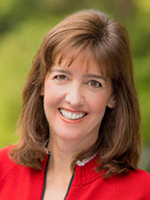Available April 19
Find New View EDU on Apple Podcasts, Google Play, Spotify, Stitcher, and many other podcast apps.
What’s the difference between educating students for the future, and simply “doing school?” Are we designing school communities that foster the development of better adults, or are we clinging to old ideas about content and rigor that no longer serve us well? And what role do parental expectations, higher ed, and societal pressure play in the decisions we make about how schools function? Denise Pope is a speaker, author, senior lecturer at the Stanford Graduate School of Education and co-founder of Challenge Success. She joins host Tim Fish to talk about how a total reframe of our definitions of success, the purpose of school, and what well-being looks like are vital to turning the tide after the challenges of the past few years.
Denise Pope is a speaker, author, senior lecturer at the Stanford Graduate School of Education and co-founder of Challenge Success. She joins host Tim Fish to talk about how a total reframe of our definitions of success, the purpose of school, and what well-being looks like are vital to turning the tide after the challenges of the past few years.Arguing that schools exist to create “better adults” for our collective future, Denise delves into a wealth of research and experience showing that what we say we believe about the importance of well-being in schools, and what we actually design into our educational frameworks, are fundamentally mismatched. While parents and educators say they want to foster happiness and well-being in students, the students report receiving a very different message. Pressure to perform academically and otherwise is taking a toll on kids, and it’s coming from all sides, including higher ed. And in the race to create high achievers, Denise notes, we may have lost track of the basics – like Maslow’s hierarchy, which requires safety before learning.
What’s the antidote? First, Denise encourages schools and parents to pay attention to the importance of protective factors in kids’ lives. More rigor, more scheduling, more activities and more achievements have taken the place of downtime, creativity, family time, and even sleep. What can we do to reclaim protective factors in kids’ lives, and design schools that support them? Secondly, in a constantly evolving world where the jobs of the future haven’t even been conceived of yet, are the old ideas about content and workload serving students well? Denise prescribes the SPACE framework – attention to scheduling, project-based learning, authentic assessment, care, and educating the community about the developmental needs of students – as a path forward to redesigning schools that truly nurture well-being and create better adults.
Key Questions
Some of the key questions Tim and Denise explore in this episode include:
- For the past 100+ years, learning content and skills has been at the center of school design. Thinking about child development and psychology, should we put something else in the center of school design?
- What are the essential ingredients for well-being for young people?
- Where do parents get lost on their journey to raise competent adults? What are the habits of parents who are inspiring, and what sets them apart?
- What excites you about the work being done in schools right now? What worries you?
Episode Highlights
- Rigor is not the same thing as load…What I see with schools, it's exactly what you're seeing. They say, academic excellence, academic excellence. That's what our parents are sending their kids here for. And that's what we say we're going to promote. And academic excellence can very much be in the definition that, that you and I just set out, around critical thinking, around the skills they need, around teamwork, around cooperation, around weighing really challenging issues. And they need to see that that is not just piling on more stuff. And it's not the traditional way that they've been teaching, which is scary. Change is scary. (10:10)
- We're hearing I want my kid to be happy. I want them to be healthy. I want them to be fulfilled. I want them to go on to, you know, be independent and go to college and get a job. And what they say they want for success is not necessarily translated to their kids. So when we ask the kids how they define success, it's often money, grades, test scores, college, popularity.” (16:47)
- “The parents have to do their jobs, but the school has to do their job too. And that's one of the main things we talk to schools about. Less is more. What's going on with your schedule, what's going on with your homework policy. What's going on with the fact that they have to take so many classes at a time, or so many advanced placement or honors things happening at the time, right? Less is more.” (25:34)
- “You've got to fix the relationships happening at school first and foremost. You've got to make sure that kids are sleeping, that they have room for mental health, that they are not going, you know, 24-7 like chickens with their heads cut off. And then when you've created that space of belonging and health and safety, let's go to the next step on Maslow's hierarchy.” (39:09)
Resource List
- Get more information about Denise’s work with Challenge Success
- Check out these titles by Denise Clark Pope
- Watch Denise on the Today show: Pandemic has Kids More Stressed, Less Engaged with School
- Listen to more of Denise’s insights on the Stanford School’s In Podcast: Student Stress During the Pandemic